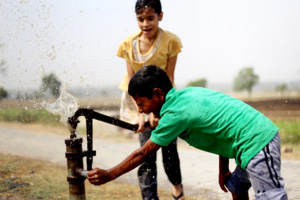
By Martin Townsend, Director for Centre of Excellence for Sustainability at BSI.
Putting water further up the climate agenda was a key goal for COP27 in Egypt. Delegates perhaps did not expect a first-hand experience of water scarcity themselves. According to The Guardian, water fountains ran dry and bottled water was near impossible to find in the climate summit’s early days, under intense sun and 30-degree-C temperatures.
While it made for wry headlines, perhaps it was no bad thing for delegates to experience as a temporary inconvenience water insecurity that for 3.6 billion people is a permanent problem. That figure is expected to grow to 5 billion by 2050, intensified by the effects of climate change.
Between 2001 and 2018, 74% of all natural disasters were water-related, according to UN-Water. Extreme storms, droughts, and floods continue to increase in frequency and severity. On the pavilion of Pakistan, which saw 30% of its surface submerged in tragic floods this year, a sign warned, “What goes on in Pakistan won’t stay in Pakistan.”
Water is so obviously essential for everyday life, for food production, for industrial processes. It also is increasingly vital to reducing emissions – as a feedstock for green hydrogen, in hydropower, used as a balancing factor for wind and solar, managing wastewater to reduce methane emissions, and well-managed wetlands, irrigation and river systems as carbon sinks. So, it is important that we change our attitudes to value water as the finite resource it is, while thinking about how we get smarter about managing it to meet the many and growing demands we are putting on the supply. To strike this balance between supply and demand, we need to look at both sides of the equation, develop new supply-side solutions, as well as becoming more aware and more efficient in our demand for water. This is a role we can all play, from consumers and businesses alike.
Getting companies to design products that use less water in their production or use is equally important. Sharing best practice on how to achieve that should be a priority. But as with claims from companies on their plans to be carbon neutral, those claims need to be independently verified, using standards developed by experts with decades of experience in the field.
Water is one of our most fundamental resources. Progress in recognizing its importance to the climate agenda was certainly made as COP27 heads to a close. The real work in changing not just attitudes but actions is only just beginning.



